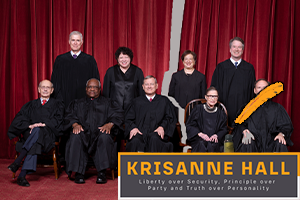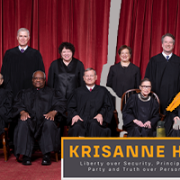Gorsuch Sides With Scalia
Gorsuch Sides With Scalia
by JC Hall

I thoroughly enjoy listening to and helping my wife, KrisAnne Hall dissect the legal opinions of this current Supreme Court. I have discovered that going through these opinions is one of the best ways to learn about how our system is functioning, as opposed to how it should be functioning. It has also been extremely clarifying to see the blind spots and ideological biases of the various Justices. The US v Davis case is yet another fascinating glimpse into the Constitutional views of the All-powerful Nine-member Band. In this case Justice Gorsuch delivers another powerful defense of Constitutional principles.
In writing the majority opinion for US v Davis, Gorsuch sides with the late Justice Antonin Scalia (Johnson v US). Gorsuch holds in Davis that overly vague criminal laws offend both due process and separation of powers – due process, by failing to give individuals a clear definition of forbidden activity; separation of powers, by forcing the courts, not Congress, to define criminal conduct.
Justice Scalia put the first nail in the coffin in 2015 with his majority opinion in Johnson v US. In Johnson, Scalia declared the very same statutory language before the court in Davis, to be vague and unconstitutional. Justice Scalia wrote, “Government violates this guarantee (due process) by taking away someone’s life, liberty, or property under a criminal law so vague that it fails to give ordinary people fair notice of the conduct it punishes, or so standardless that it invites arbitrary enforcement.” (as an aside, too bad Scalia didn’t seem to hold this view consistently when it came to Kelo v New London)
The Supreme Court dealt with the phrase again in April 2018 in Sessions v Dimaya. The majority explained that the Constitution disallowing vague laws, “guards against arbitrary or discriminatory law enforcement by insisting that a statute provide standards to govern the actions of police officers, prosecutors, juries, and judges.” Counting US v Davis, the vague language in these statutes has now struck out three times. Since Gorsuch may have dealt the decisive blow, some may start to notice that his consistent liberty-minded approach on this issue is a real threat to the bipartisan fetish for big government.
Gorsuch seems to operate on a consistent principle that vague statues run afoul of the Constitution. If a citizen cannot know what the law demands of him, then his liberty is in jeopardy. This stirs the ire of both regulatory-minded, control-freak leftists and statist, police-state conservatives.
In the case of civil statutes that empower the government’s vast regulatory behemoth Gorsuch says, “Congress must set forth standards sufficiently definite and precise to enable Congress, the courts, and the public to ascertain whether Congress’s guidance has been followed….A statute that does not contain ‘sufficiently definite and precise’ standards ‘to enable Congress, the courts, and the public to ascertain’ whether Congress’s guidance has been followed at once presents a delegation problem and provides impermissibly vague guidance to affected citizens.” This angers the new, green Marxists. They need vague regulatory authority for unelected bureaucrats to have free reign to legislate through the unaccountable “fourth-branch” of our post-constitutional government.
In the case of criminal statutes, Gorsuch holds that, “In our constitutional order, a vague law is no law at all. Only the people’s elected representatives in Congress have the power to write new federal criminal laws. And when Congress exercises that power, it has to write statutes that give ordinary people fair warning about what the law demands of them.” This angers the police-state conservatives who wish to empower the government to run roughshod over the citizens’ liberty in order to stop a “bad guy” from doing “bad things” and then throw the book at him with as many sentence enhancements as possible. (Let’s set aside for a moment the argument that Congress lacks authority to make federal law regarding things NOT FEDERAL in the first place. That’s a blog for another day.)
Kavanaugh, for his part, did his best to make the police-state argument, “Bad guy do bad things. Bad guy must pay.” His dissenting rant against gun ownership as being violent “by its very nature,” has him sounding like some raving leftist, gun-grabber from the House of Representatives, proving that a statist is a statist no matter if he sits on the left side of the sofa or the right.
Since SCOTUS is increasingly seen as the final oracle of truth on all matters whatsoever, we will see how Congress, judges, and others in the legal system adjust to this blow to vague statutory language. Destroying this “wiggle room,” as our founders intended, would be a significant bulwark against the assaults on individual liberty by the regulatory state as well as by the police state. Unfortunately, many Americans will miss the significance of this opinion since so many have been programmed to think in binary terms of left and right. So, they typically interpret SCOTUS opinions like the rest of their reality, by counting the number of “left supporters” versus the number of “right supporters.” So, 99 times out of 100, this story will be reported and interpreted as “Gorsuch sides with left,” or “Conservative Duel: Gorsuch v Kavanaugh.” There is only one dichotomy that matters, Liberty versus Tyranny. None of these guys are perfect, but thus far Gorsuch seems to hold to the principles of liberty more consistently than any of his colleagues.
Learn More about our How our Judiciary is SUPPOSED to work with this DVD



